In 1885, Sarah Elisabeth Goode was awarded a patent for a bed that folded into a roll-top desk, an invention she designed to save space in cramped Chicago apartments.
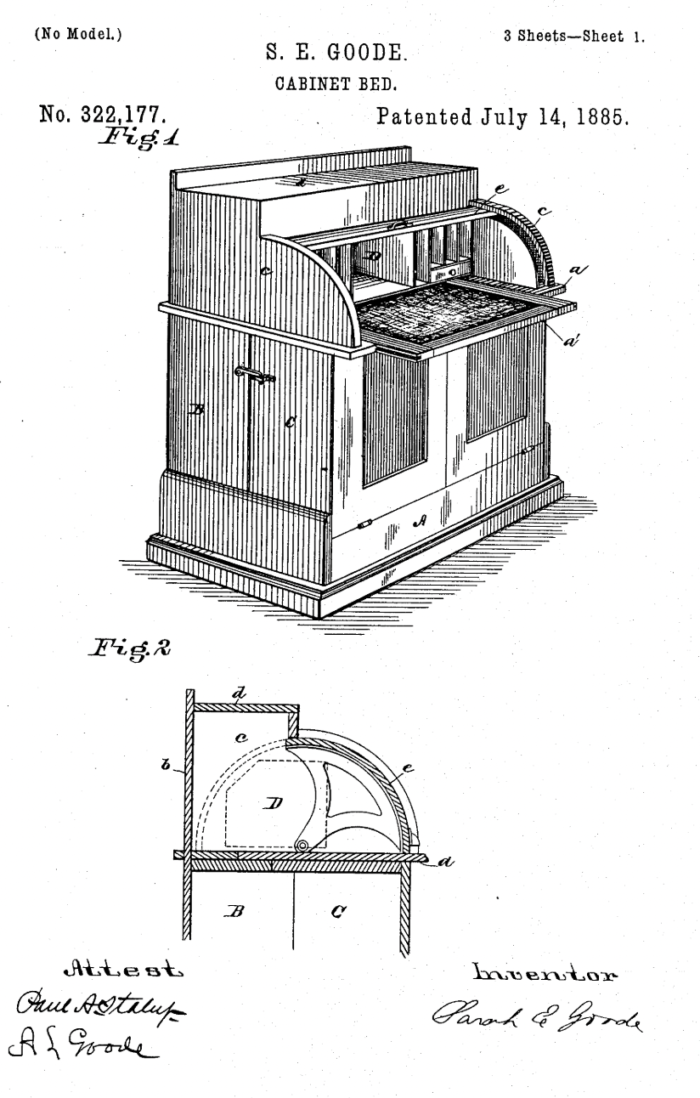
U.S. Patent OfficeThe folding cabinet bed invented by Sarah Goode was one of the first patents granted to a Black woman.
A dough kneader, a folding bed, and a corn husking machine. These were among the first inventions patented by Black women in the years following the Civil War. Sarah Goode was one of those inventors.
Within a few years of the Emancipation Proclamation and the end of the Civil War, Black women began applying for patents to receive credit for their inventions. In 1885, Goode became one of the first African American women to be awarded a patent.
Little is known about Goode’s early life, but some records suggest that she was born into slavery. When she was young, her family moved to Chicago, and she ultimately settled down in the city and opened a furniture store with her husband. It was this business that inspired her invention.
In 1883, Goode submitted an application for her folding bed, a precursor to the Murphy bed that was invented in the early 20th century. While she never achieved widespread fame for her design, it was featured at the Paris Exposition of 1900, marking Sarah Goode’s place in Black history.
Who Was Sarah Goode?
Few records exist from Sarah Elisabeth Goode’s earliest years. She was one of seven children of Oliver and Harriet Jacobs, and she may have been born into slavery sometime between 1850 and 1855. By the time she was five, her family was living in Toledo, Ohio. There, her mother worked with the Ohio Anti-Slavery Society to organize aid for enslaved people traveling on the Underground Railroad.
The family later moved to Chicago, where Goode’s father was a carpenter. She eventually met and married Archibald Goode, an upholsterer and stair builder.
In the 1880s, the newlyweds opened a furniture store on State Street. Many of their customers were Chicago residents who lived in small houses or apartments.
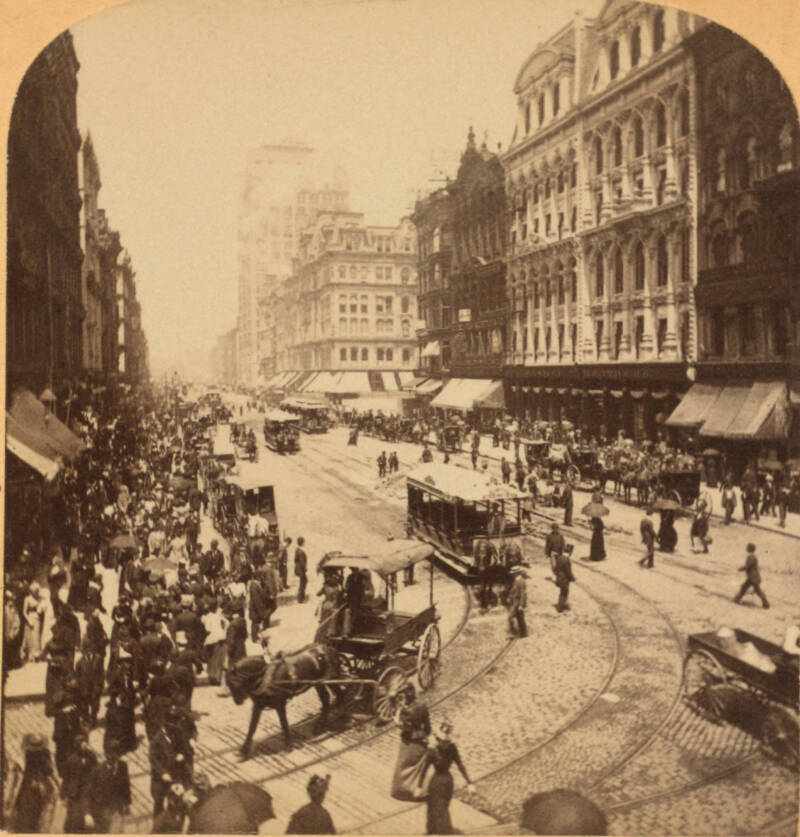
Old Paper Studios / Alamy Stock PhotoChicago’s State Street in the 1890s.
As Sarah Goode talked to these customers, she noticed that they frequently lamented about having no space for storage or hefty furniture. These complaints gave her an idea.
Inventing The Folding Cabinet Bed
In the late 19th century, tenement housing came to Chicago, with multiple people often squeezing into a single room. And even those who didn’t live in tenements struggled with a lack of space in their apartments and townhouse.
So, Sarah Goode created a type of folding cabinet bed that was a precursor to the Murphy bed.
When not in use, Goode’s bed looked like a roll-top desk with various storage compartments for things like writing utensils and stationery. It could then be unfolded to reveal the bed hidden within. Opening a flap on either side of the center section allowed users to pull out a full-length bed that lay perpendicular to the desk. The unfolded bed featured supports that kept it sturdy at night.
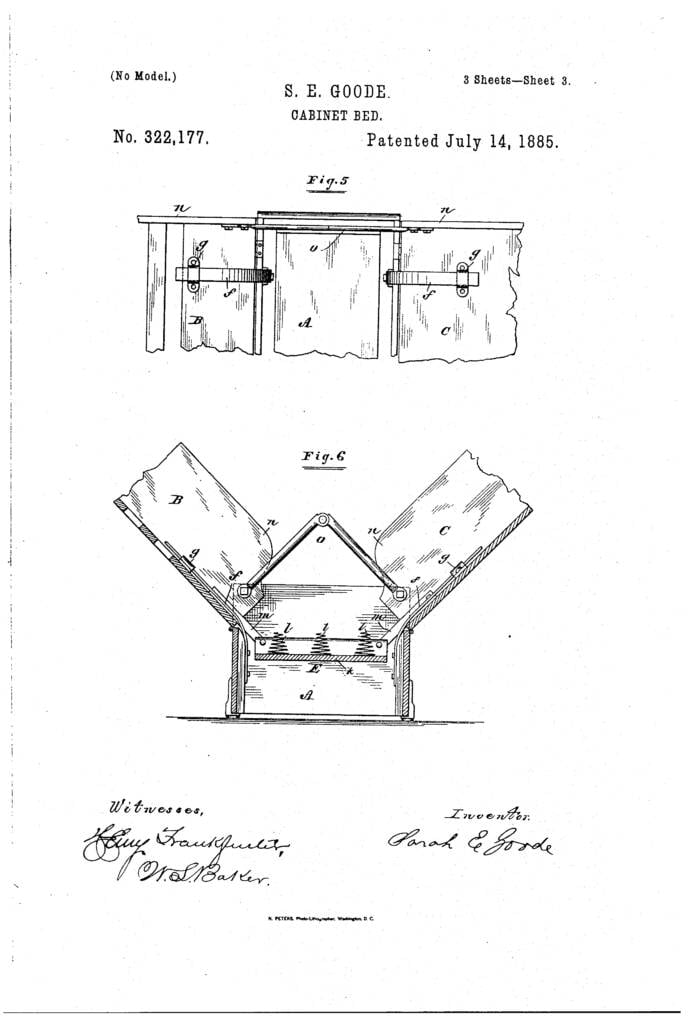
U.S. Patent OfficeSarah Goode’s folding cabinet hid a bed inside a roll-top desk.
Goode invented this cabinet bed to help her customers maximize their living spaces. They could lift and fold the bed, tucking it away when not in use.
In her patent application, Sarah Goode described the invention as “adapted to be folded together when not in use, so as to occupy less space, and made generally to resemble some article of furniture when so folded.”
Goode explained that the desk was “suitable for office or general use” but also acted as a counterbalance to the weight of the bed. “[F]olded together, the bed has all the appearance of an ordinary office desk, and may be used as such,” she wrote. “The entire desk, being attached to and forming a part of the head-section of the bed, does not in any way interfere with the folding or unfolding of the bed, and by the novel construction thereof the contents of the desk will be very little deranged by the turning necessary in unfolding the bed.”
The U.S. Patent and Trade Office approved Goode’s patent in July 1885.
Other Black Women Inventors In The 1880s
Sarah Goode was one of several Black women who received patents in the 1880s. The year after Goode submitted the patent application for her folding cabinet bed, Judy Reed was awarded a patent for her dough kneader. The invention kneaded and rolled dough more evenly than similar appliances on the market.
Reed used her initials on the patent application, possibly to obscure her gender.
In 1888, Miriam Benjamin patented her design for a chair that signaled attendants. Someone sitting in the chair could simply press a button to raise a flag and sound a gong.
Benjamin’s patent made headlines as a useful invention. The U.S. House of Representatives installed a system based on Benjamin’s chair in the 1890s so that Congressmen could signal pages. Benjamin’s system would also inspire the flight attendant signals on airplanes.
Like Goode, Benjamin had a career outside of her inventions. She attended Howard University and worked as a teacher in Washington, D.C. public schools and also became an attorney. In 1917, she patented a shoe sole that promoted foot health.
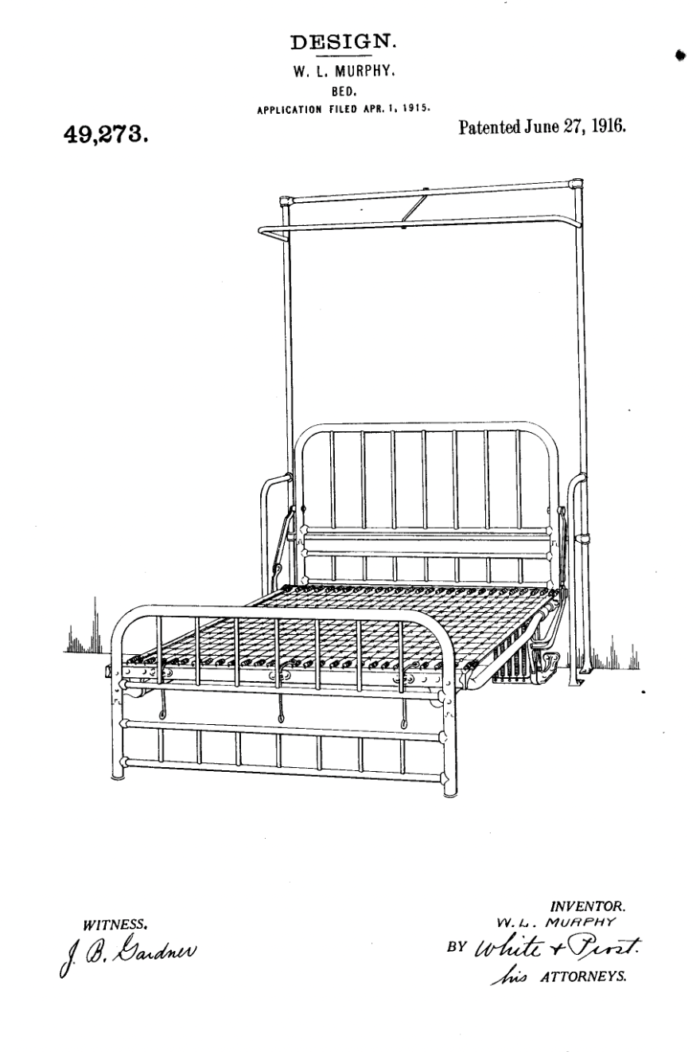
U.S. Patent OfficeThe Murphy bed, patented in the early 20th century, was first called “The Disappearing Bed.”
But who was the first Black woman to receive a patent? Virginian Martha Jones was awarded a patent in 1868 for her machine to husk and shell corn. In addition to stripping the kernels from the corn cob, Jones’ invention cut up the husks, which could be used as animal feed or to fill mattresses.
The U.S. Patent Office did not require inventors to list their race or gender on 19th-century patent applications, so, in theory, there was no discrimination when deciding which inventions to grant patents to. However, white slave owners sometimes claimed the work of Black enslaved inventors as their own.
For that reason, it took Black Americans — and Black women, in particular — a longer time to earn patents. In fact, it’s believed that Sarah Goode was just the fourth African American woman to do so.
The Legacy Of Sarah Goode’s Folding Bed
It’s unclear whether Sarah Goode ever sold her folding cabinet bed at her furniture store. However, she and her husband did showcase their inventions at state fairs, and her patent was even featured in a showcase of African American inventors at the Paris Exposition of 1900.
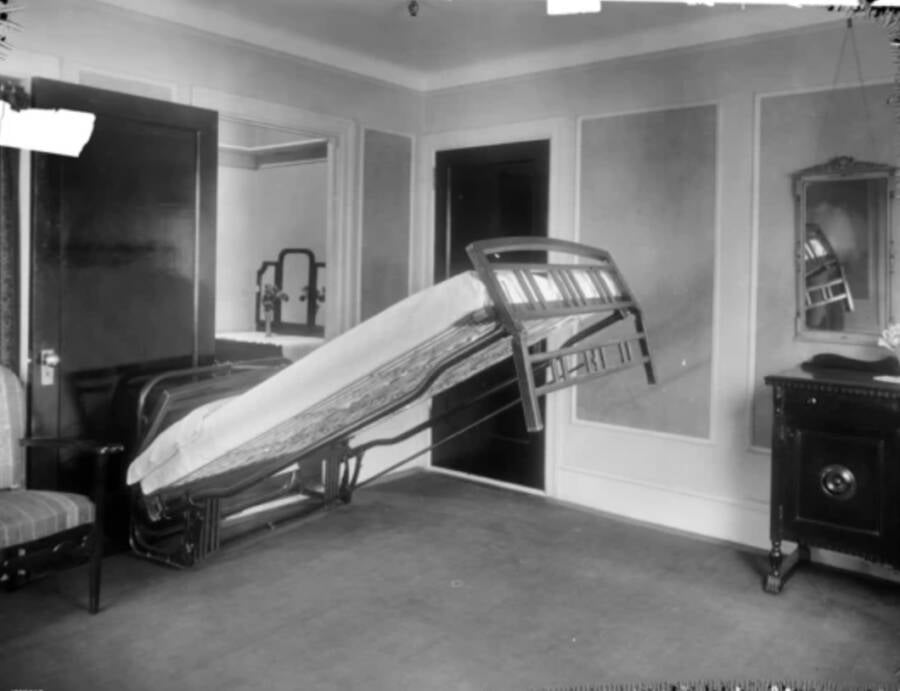
Museum of the City of New YorkUnlike Sarah Goode’s folding bed, which transformed into a functional desk, the Murphy bed retracted into the wall.
Goode earned the patent for her bed more than two decades before William Murphy patented the Murphy bed. The folding cabinet bed and the Murphy bed served a similar function to the Japanese futon, which became popular in the U.S. in the 1970s.
By the time Murphy patented his bed, Goode had died. She passed away on April 8, 1905, and was buried in Chicago’s Graceland Cemetery. In 2012, Chicago Public Schools opened the Sarah E. Goode STEM Academy to celebrate Goode’s achievements as a Black female inventor.
Sarah Goode was just one of many Black Americans who designed groundbreaking inventions. Next, learn about the most influential Black inventors. Then, learn about Black millionaire and entrepreneur Madam C. J. Walker.





